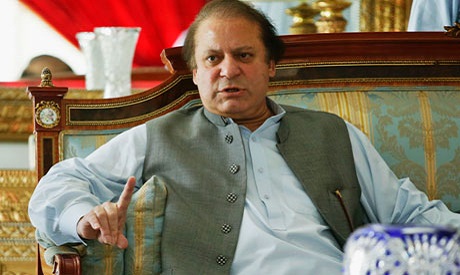
Nawaz Sharif, PML-N leader, speaks to reporters at his Lahore home (Photo: Reuters)
Pakistan has railed against Washington for killing a Taliban leader as peace talks were being prepared, but analysts said diplomatic and financial considerations mean the latest spat with Washington is unlikely to move beyond fiery rhetoric.
Interior minister Chaudhry Nisar slammed Friday's attack as the US sabotaging fledgling peace efforts, coming as government representatives were to meet the Tehreek-e-Talban Pakistan (TTP).
Prime Minister Nawaz Sharif on Monday used his first public speech since the drone attack to say the cycle of violence plaguing Pakistan could not be ended by "unleashing senseless force against our citizens" without giving peace efforts a chance.
The government's anger echoes the outrage that came after US special forces infiltrated the country to kill Osama bin Laden in a raid the Pakistanis were given no notice of.
Nisar has pledged a complete review of ties with Washington, which have been warming in recent months after lurching from crisis to crisis in 2011 and 2012.
The foreign ministry summoned the US ambassador to protest at the drone strike, and there have been calls by opposition parties to block NATO supply routes into Afghanistan.
Pakistan took this step after a botched US air raid killed 24 soldiers at a border post in November 2011.
But analyst Hasan Askari said there would be little support for a similar move following the death of a man whose network has killed thousands in a six-year campaign against the state.
"Pakistan would be isolated. At the moment Pakistan looks like defender of Hakimullah Mehsud and there will be no international support to Pakistan on this issue," he told AFP.
The fiery rhetoric over the weekend resonates with deep-running anti-US feeling among the Pakistani public, but it contrasts sharply with the positive messages emanating from Sharif's visit to Washington last month.
Just a fortnight ago, as US President Barack Obama welcomed Sharif to the White House, the State Department announced the release of $1.6 billion in aid, including $1.38 billion for the country's powerful military.
Analyst and newspaper columnist Mosharraf Zaidi said that as long as Pakistan was so keen to take Washington's dollars, its regular protests about drones being a violation of sovereignty would ring hollow.
"If you have a problem with America taking out a guy you were about to hold talks with, fine, but you can't review relations two weeks after you're thanking the US for giving you more money," he told AFP.
"Pakistan is both taking money from the US and then telling the US what to do, it's a non-starter -- Pakistan wants security sovereignty without fiscal sovereignty."
Further tying Islamabad's hands, said Zaidi, is the $6.7 billion International Monetary Fund loan deal agreed to help Pakistan rebuild its shattered economy.
Some have questioned what substantive moves towards peace had actually taken place -- and suggested that the elimination of a hardliner like Mehsud could even benefit the process.
Nisar on Saturday indicated that a significant dialogue was about to swing into action, but in the days before the drone strike both government and Taliban sources said contacts were at a very embryonic stage.
If Nisar knew of advances that have not been made public, Zaidi said, now is the time to share them.
"Given this is a group that has said they do not believe in the constitution, the only possible starting point for negotiations would be the acceptance of the constitution or the surrender of the TTP," he said.
What happens next for the peace process, which has been supported by all the main political parties, depends to a large extent on who is chosen to replace the radical Mehsud.
Imtiaz Gul of the Islamabad-based Centre for Research and Security Studies said there appeared to be division within the TTP since Mehsud's death.
The emergence of a more pragmatic -- if not more moderate -- leader could take things forward, he told AFP.
"Hakimullah Mehsud had been the symbol of the rejection of state of Pakistan and had issued several video messages telling the people to reject the present system and support imposition of Islamic Sharia," he said.
The choice of the new TTP leader is not expected for several days at least.
Short link: